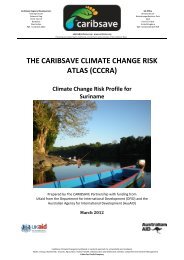Create successful ePaper yourself
Turn your PDF publications into a flip-book with our unique Google optimized e-Paper software.
“Strengthening health systems to cope with the increased health threats posed by climate change,<br />
including emergencies related to extreme weather events <strong>and</strong> storm surge;<br />
Advocacy <strong>and</strong> awareness about diseases within the Health sector <strong>and</strong> the general public;<br />
Partnership with other agencies <strong>and</strong> other sectors at local, national, regional <strong>and</strong> international<br />
levels to ensure that health protection <strong>and</strong> health promotion are central to climate change<br />
adaptation <strong>and</strong> mitigation policies;<br />
Promote preventative health care <strong>and</strong> the collection <strong>and</strong> analysis of scientific data relating to<br />
incidence of disease.”<br />
(Climate Change Committee, 2011b)<br />
Following the green paper, the draft Climate Change Policy was developed with developed these areas as<br />
well as<br />
“Educate the public about best practices to deal with vector <strong>and</strong> water borne diseases emphasizing<br />
that prevention is better than cure;<br />
Improve preventative health care facilities <strong>and</strong> services as well as build the human resource<br />
capacity at these facilities;<br />
Develop emergency response procedures that can h<strong>and</strong>le p<strong>and</strong>emics <strong>and</strong> epidemics, <strong>and</strong> increases<br />
in vector <strong>and</strong> water-borne diseases.”<br />
(Climate Change Committee, 2011a)<br />
The recent impacts of the 2008 hurricane season <strong>and</strong> the global economic recession have all contributed to<br />
the weakening of the economy (RLB, 2010). The decline in budget spending allocated to the health sector<br />
after 2008 was expected to contract due to “high cost of overseas treatment, a fall in user fees <strong>and</strong> higher<br />
contingent spending to return service to normal” (ECLAC, 2008). The government spending on health care<br />
is significant; it is estimated to be 22% of the GDP for 2008 (WHO-AIMS, 2009) <strong>and</strong> previous to 2004<br />
allocation to the Ministry of Health was estimated to be 18% of the territory’s expenditure (DEPS, 2004).<br />
Expenditure for treatment abroad is also substantial due to the limited services in the territory (WHO-AIMS,<br />
2009). Directly related to the health care sector, these challenges along with a possible increase in diseases<br />
as well as increasing cost of water, sewerage <strong>and</strong> sanitation, may put added stress on the health care<br />
system, resulting in a rise in the overall cost of health care (Climate Change Committee, 2011b).<br />
As mentioned above, the Tropical Storm Hanna <strong>and</strong> Hurricane Ike caused significant damage to the health<br />
sector in 2008 amounting to US $29.7 million, 11% was due to damages <strong>and</strong> 89% due to losses (ECLAC,<br />
2008). Table 5.4.1 below gives a breakdown of the total damages <strong>and</strong> losses. Overseas treatment<br />
particularly for persons requiring dialysis <strong>and</strong> other emergency needs, accounted for the greatest<br />
expenditure as the Gr<strong>and</strong> Turk Hospital <strong>and</strong> other important institutions in the health care network<br />
suffered damages during Hurricane Ike (ECLAC, 2008). There is therefore a need to cater for these<br />
vulnerabilities. One initiative that addresses this <strong>and</strong> thus represents <strong>and</strong> adaptation of the health sector to<br />
current challenges was the construction of two new hospitals in the territory which are discussed in the<br />
following subsection.<br />
122





